The savage austerity in Greece has affected people’s lives in many different ways. The hardship faced by Greek people has been directly reflected in their psychological condition.
-
-
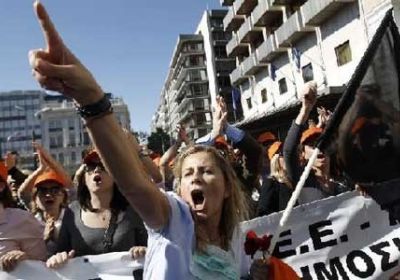
“There is money.” That was the major election campaign slogan of the Panhellenic Socialist Movement (PASOK) in October 2009.
-
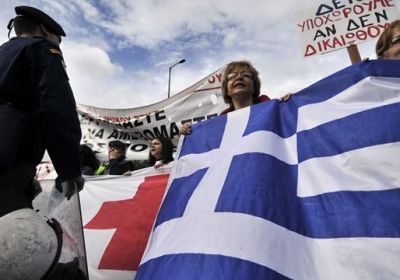 Over October 19-20 there was a general strike in Greece. The overwhelming majority of Greek workers took part in the strike with dynamic demonstrations and other forms of action. In that way, Greek people expressed their anger and despair over the devastating measures carried out in Greece in the past year and a half. The relentless, vicious austerity measures have been imposed by the PASOK (Panhellenic Socialist Movement) government and the “troika” of the International Monetary Fund, the European Central Bank (ECB) and the European Union.
Over October 19-20 there was a general strike in Greece. The overwhelming majority of Greek workers took part in the strike with dynamic demonstrations and other forms of action. In that way, Greek people expressed their anger and despair over the devastating measures carried out in Greece in the past year and a half. The relentless, vicious austerity measures have been imposed by the PASOK (Panhellenic Socialist Movement) government and the “troika” of the International Monetary Fund, the European Central Bank (ECB) and the European Union. -
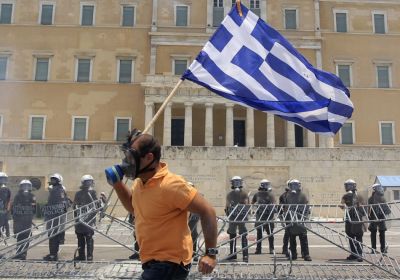 In the space of barely more than a weekend, the deal that was supposed contain the euro crisis has unravelled entirely. The call for a referendum on the so-called rescue package by Greek Prime Minister Georgios Papandreou, later retracted under huge pressure, merely capped its rapid unravelling. The prospect that the European Unions’ principal victims could be asked their opinion of the policies inflicted on them provoked near-hysteria in respectable quarters. EU leaders, Greek politicians, and the financial markets united to denounce the threat of an unseemly democratic intrusion.
In the space of barely more than a weekend, the deal that was supposed contain the euro crisis has unravelled entirely. The call for a referendum on the so-called rescue package by Greek Prime Minister Georgios Papandreou, later retracted under huge pressure, merely capped its rapid unravelling. The prospect that the European Unions’ principal victims could be asked their opinion of the policies inflicted on them provoked near-hysteria in respectable quarters. EU leaders, Greek politicians, and the financial markets united to denounce the threat of an unseemly democratic intrusion. -

A victory was achieved by the anti-memorandum, anti-government movement on October 28. It was commemoration day of the resistance to the German occupation of Greece, which started in 1940.
-
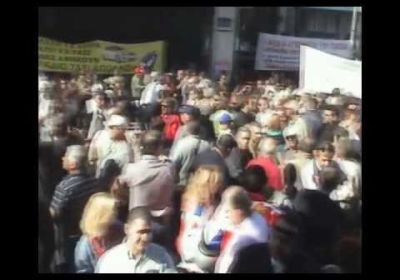
Scenes from the largest general strike that took place in Greece in the last decades. Over a million people filled the streets demanding the overthrow of the goverment and its austerity measures.
-

A 50% cut of part of Greece’s debt was decided on by a summit of European leaders on October 26. The deal will entail long-term austerity measures being enforced on the Greek people.
-
Striking Greek public-sector workers paralysed transport and left rubbish piling up in Athens and Thessaloniki on October 14, the Morning Star said that day. The strike was the latest salvo against the European Union-International Monetary Fund campaign to make working people pay for the banking crisis. Rubbish collectors stayed off the job for a 10th consecutive day, the article said. Members of the All Workers Militant Front also blockaded the Acropolis for a second day.
-
 The lead-up to the payment of the sixth installment of International Monetary Fund (IMF) loans to Greece, to be handed out in October, finds Greek people in a state of shock and helplessness. The first “memorandum” agreement was signed by the Panhellenic Socialist Movement (PASOK) government with the IMF and European Union (EU) representatives in May 2010. It came after two decades of savage neoliberal attacks by successive New Democracy (the major right-wing party) and PASOK (so-called “socialist”) governments.
The lead-up to the payment of the sixth installment of International Monetary Fund (IMF) loans to Greece, to be handed out in October, finds Greek people in a state of shock and helplessness. The first “memorandum” agreement was signed by the Panhellenic Socialist Movement (PASOK) government with the IMF and European Union (EU) representatives in May 2010. It came after two decades of savage neoliberal attacks by successive New Democracy (the major right-wing party) and PASOK (so-called “socialist”) governments. -
 Speaking in Rome on September 15, Lorenzo Bini Smaghi, Italian executive board member of the European Central Bank (ECB), said of the design of the euro: “The assumption was made ― largely theoretical ― that there would be no crises.” Oh, indeed. And now with Europe and the world showing every sign of dipping into a recession that will further stress Euope's common currency, what is to be done?
Speaking in Rome on September 15, Lorenzo Bini Smaghi, Italian executive board member of the European Central Bank (ECB), said of the design of the euro: “The assumption was made ― largely theoretical ― that there would be no crises.” Oh, indeed. And now with Europe and the world showing every sign of dipping into a recession that will further stress Euope's common currency, what is to be done? -
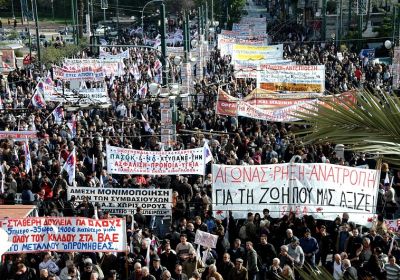 “Bloody Greeks — corrupt and lazy, born cheaters who think the world owes them a living. Why should the hard-working taxpayers of the euro zone core economies like Germany have to fund billion-euro rescue packages for those scoundrels?” That’s the vicious tone of Germany’s tabloids and conservative politicians towards Greece’s galloping public debt crisis and the Greek people’s protests against the austerity programs. The austerity has been imposed on them by the European Union, European Central Bank and International Monetary Fund (the “troika”) as the price of bail-out funding.
“Bloody Greeks — corrupt and lazy, born cheaters who think the world owes them a living. Why should the hard-working taxpayers of the euro zone core economies like Germany have to fund billion-euro rescue packages for those scoundrels?” That’s the vicious tone of Germany’s tabloids and conservative politicians towards Greece’s galloping public debt crisis and the Greek people’s protests against the austerity programs. The austerity has been imposed on them by the European Union, European Central Bank and International Monetary Fund (the “troika”) as the price of bail-out funding. -
“At least 87 [Greek university] departments were under student occupation, with the number increasing by the hour,” OccupiedLondon.org said on August 31. “General Assemblies are happening all of this and next week and it is very likely that the number will increase dramatically. “There seems to be a completely unprecedented agreement between students across almost the entire political spectrum for mobilisations against the voted law: this is rapidly becoming a stand-off between the Student community and the Parliament.”